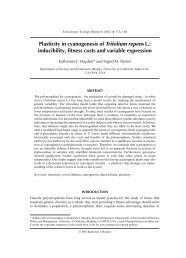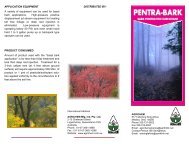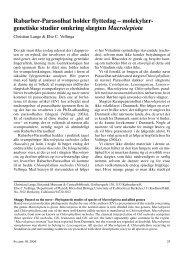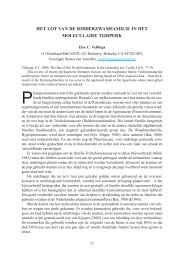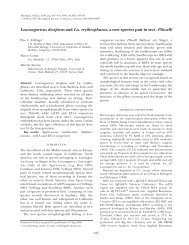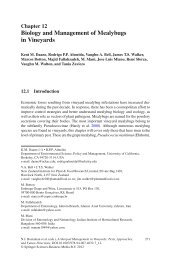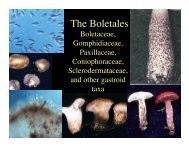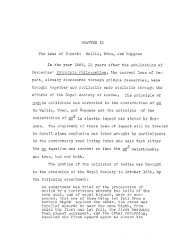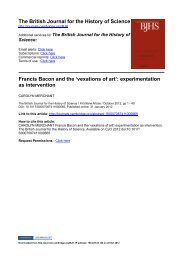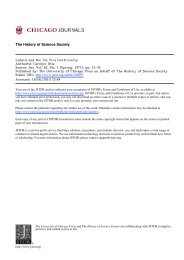- Page 1: Disease transmission in heterogeneo
- Page 5 and 6: variation is quantified from outbre
- Page 7 and 8: ACKNOWLEDGEMENTS I’ve been fortun
- Page 9 and 10: Engineering Research Council of Can
- Page 11 and 12: Epidemic modelers face an essential
- Page 13 and 14: casual contact (DCC), common usage
- Page 15 and 16: HCW, and patient pools) and dynamic
- Page 17 and 18: Hoffmann 2004; Shen et al. 2004)—
- Page 19 and 20: Chapter Two Frequency-dependent inc
- Page 21 and 22: principles and reach robust conclus
- Page 23 and 24: partnership, disease and demographi
- Page 25 and 26: transmission to incorporate this ph
- Page 27 and 28: This result can be understood intui
- Page 29 and 30: Garnett 2002). We simulated epidemi
- Page 31 and 32: 4. Infection-induced changes in pai
- Page 33 and 34: susceptible population (Diekmann an
- Page 35 and 36: epidemics, since they bring R0 clos
- Page 37 and 38: equired.) For slower-moving, chroni
- Page 39 and 40: addressed here. Our treatment consi
- Page 41 and 42: Table 1. Results for epidemics with
- Page 43 and 44: (Equations 3 and A4); the lighter l
- Page 45 and 46: Figure 2 A) B) Total proportion inf
- Page 47 and 48: Appendix Derivation of SI pair dens
- Page 49 and 50: As described in Section 2, our goal
- Page 51 and 52: can be calculated as the product of
- Page 53 and 54:
Chapter Three Curtailing transmissi
- Page 55 and 56:
egions with on-going epidemics has
- Page 57 and 58:
transmission to the general communi
- Page 59 and 60:
and Ih), as well as from off-duty t
- Page 61 and 62:
ours—see Diekmann & Heesterbeek (
- Page 63 and 64:
In all cases (Figure 2C, 2D), we id
- Page 65 and 66:
Sensitivity to quarantining rate (s
- Page 67 and 68:
precautions in the hospital (η→1
- Page 69 and 70:
Preventing generalized community tr
- Page 71 and 72:
everywhere. These robust conclusion
- Page 73 and 74:
increasingly significant contributi
- Page 75 and 76:
hospitals or wards. Future work on
- Page 77 and 78:
Table 1. Summary of transmission an
- Page 79 and 80:
formulation of our model allows for
- Page 81 and 82:
Figure 3 (A) Increase in cumulative
- Page 83 and 84:
Figure 1 74
- Page 85 and 86:
Figure 3 (A) (B) (C) Cumulative num
- Page 87 and 88:
Appendix Sensitivity to population
- Page 89 and 90:
symptomatic HCWs is low. Indeed, th
- Page 91 and 92:
E I I I I m, i m, 1 m, 2 m , 3 m ,
- Page 93 and 94:
for a stochastic epidemic: the prob
- Page 95 and 96:
progress through the age sub-compar
- Page 97 and 98:
We therefore wish to characterize t
- Page 99 and 100:
Figure S4 Distribution of (A) incub
- Page 101 and 102:
Figure S2 (A) (C) 92 (B) (D)
- Page 103 and 104:
Figure S4 (A) (B) Proportion of cas
- Page 105 and 106:
1. Introduction During the global e
- Page 107 and 108:
quantity p0, the proportion of case
- Page 109 and 110:
model selection techniques, lending
- Page 111 and 112:
elatively mild variation in ν, sho
- Page 113 and 114:
cannot make inferences based on the
- Page 115 and 116:
low k extinction happens within the
- Page 117 and 118:
measured by the variance-to-mean ra
- Page 119 and 120:
succeed (Figure 3B). For a given re
- Page 121 and 122:
to lower infectiousness. Other rele
- Page 123 and 124:
observations for the diseases exami
- Page 125 and 126:
Pneumonic plague 6 outbreaks N=74 A
- Page 127 and 128:
s surveillance data. 90% CI: Bootst
- Page 129 and 130:
Figure captions Figure 1 Evidence f
- Page 131 and 132:
Figure 4 Impact of control measures
- Page 133 and 134:
Figure 2 Other Measles Influenza Ru
- Page 135 and 136:
Figure 4 C Reproductive number, R 1
- Page 137 and 138:
epresenting transmission yields a g
- Page 139 and 140:
We rescaled the AICc by subtracting
- Page 141 and 142:
for which the median of bootstrap e
- Page 143 and 144:
transmission due to the most infect
- Page 145 and 146:
an integer Z (99) such that FPoisso
- Page 147 and 148:
fv(u). Demographic stochasticity in
- Page 149 and 150:
original process is eliminated with
- Page 151 and 152:
For RA control, with a random propo
- Page 153 and 154:
∞ ( , ) ∫ ( ) ( ). k−1 −t w
- Page 155 and 156:
* and for ν < ν : ∞ ∫ ν C 1
- Page 157 and 158:
Contrib(control policy) = Pr(contai
- Page 159 and 160:
ange of the first disease generatio
- Page 161 and 162:
Figure S1 MLE estimates of k 10 1 0
- Page 163 and 164:
Figure S2 (cont) D E F k=inf k=4 k=
- Page 165 and 166:
Figure S4 Relative frequency 0.4 0.
- Page 167 and 168:
SARS (March 12) and the imposition
- Page 169 and 170:
Transmission was predominantly by i
- Page 171 and 172:
Monkeypox, Zaire 1980-1984 (Jezek e
- Page 173 and 174:
Rubella, Hawaii 1970 (Hattis et al.
- Page 175 and 176:
tracing, with the stated goal of de
- Page 177 and 178:
Table S1. Superspreading events in
- Page 179 and 180:
Measles 250 Dance party ?M First ar
- Page 181 and 182:
SARS 187+ Apartment block 26M Amoy
- Page 183 and 184:
SARS 33 Hospital 62W Undiagnosed: S
- Page 185 and 186:
SARS 24/2* Home, emergency room, IC
- Page 187 and 188:
Streptococcus group A (type 1) 100+
- Page 189 and 190:
References Abbot, P. and L. M. Dill
- Page 191 and 192:
Caswell, H. (2001) Matrix Populatio
- Page 193 and 194:
Evatt, B. L., W. R. Dowdle, M. John
- Page 195 and 196:
Health Canada (2003) Summary of Sev
- Page 197 and 198:
Kretzschmar, M. (2000). Sexual netw
- Page 199 and 200:
McCallum, H., N. Barlow and J. Hone
- Page 201 and 202:
Taylor, H. M. and S. Karlin (1998).




